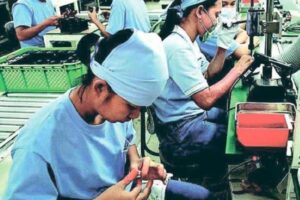
US Trade Secretary Gina Raimondo apparently thinks that labor conditions in the Philippines are so good that she wants the semiconductor industry in the country should expand and form a crucial part of the supply chain for the US chips industry.
During her recent visit, Raimondo urged Filipino businessmen to invest more in microelectronics even as the global industry is being battered by low demand, with local companies not really developing new technology on their own but are merely assembling products for foreign clients.
Moreover, there have been more closures than openings of companies catering to the chips industry, and the case of Nexperia Philippines, Inc. (NPI) is indicative of the problems that hobble Filipino workers, who are the first to lose their jobs when demand goes down despite the fact that they earn less than their counterparts in Taiwan, where the Taiwan Semiconductor Manufacturing Co. (TSMC) is based, or in the US, where Intel, Nvidia and a host of firms engaged in developing technologies at the nano scale.
On Mar. 20, 2024, leaders and members of the Nexperia Philippines Inc Workers Union (NPIWU)-NAFLU-KMU) met with the press in Quezon City and denounced NPI for violating their right to job security and decent working conditions, which the 1987 Constitution and the Labor Code of the Philippines (LCP) are supposed to protect.
Mary Ann Castillo, president of NPIWU, which is affiliated with the National Federation of Labor Unions (NAFLU) and the Kilusang Mayo Uno (KMU), slammed the unfair dismissal of eight workers in October 2023 after the surprising closure of NPI’s Sensors Department.
This move was a trial balloon as the company will cut off 126 jobs this year, calling it “temporary layoff.” Next month, NPI will dismiss 54 workers in April 2024 and another 72 will be out of work in September.
As usual, the management sees the “temporary layoff” as part of the industry’s worldwide retreat but labor leaders say that the layoffs here, as in the US, are all based on company bottomlines, meaning they are all out to preserve their superprofits at the expense of workers.
Indeed, US tech moguls and the world’s richest men do not respect labor rights and would even want their workers at their factories for more than 40 hours a week, like Elon Musk, the narcissistic, ketamine-dependent Tesla chief, Jeff Bezos of Amazon and Howard Schultz of Starbucks.
They are all allergic to unions and would prefer not to follow legal minimum wages and protections extended to workers by the UN National Labor Relations Board (NLRB.)
As Filipino lawmakers have glommed onto Musk’s anti-labor mantra, they are “amending” the economic provisions of the Constitution to make the Philippines a paradise for foreign investors, without guaranteeing protection for workers’ rights to decent wages and safe working conditions.
They are stumbling over each other to craft a Constitution that protects capital and gives short shrift to workers and peasants in a grand show of unequal protection to their own compatriots.
Let this be a challenge to these stable geniuses a la Trump: Guarantee decent wages in all foreign corporations that are about to snatch crucial economic sectors in their proposed economic provisions. (DEO MAGNO)